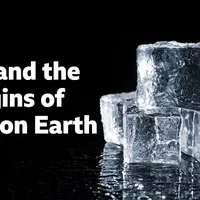230504 Ice and the origins of life on Earth
Sam:
Hello. This is 6 Minute English from BBC Learning English. I'm Sam.
Neil:
And I'm Neil.
Sam:
Have you ever made a snowman or enjoyed a cold drink on a hot summer's day?
Slippery in winter and cooling in summer, ice is made when water gets so cold it freezes.
But there's much more to ice than skiing holidays and cold drinks.
Neil:
Yes, in an exciting discovery, the James Webb Space Telescope recently detected the coldest ices ever in outer space, something Nasa scientists think could explain the origins of life on Earth.
Sam:
For years scientists have debated how life started on our planet.
Billions of years ago, long before the dinosaurs, animals or even plants existed, the Earth had a watery environment of oxygen-free gases and chemicals known as the primordial soup.
It had the potential for life to develop, but something was missing.
Neil:
So how did we jump from the primordial soup to the first living plants, animals, and eventually humans?
And how does ice fit into the story?
That's what we'll be finding out in this programme, and as usual, we'll be learning some useful new vocabulary as well.
Sam:
But first I have a question for you, Neil.
We know ice is frozen water, but do you know the chemical symbol for water? Is it:
a) H2O ? b) HO2 ? or c) H2O2 ?
Neil:
Well, I really hope I get this right. I think the answer is H2O.
Sam:
OK. We'll find out or check if you're right later in the programme.
Astronomer, Professor Melissa McClure, worked with the Nasa scientists who found ice on Europa, one of Jupiter's moons.
Here she explains to BBC World Service programme, Science in Action, one theory linking ice to the beginnings of life on Earth.
Professor Melissa McClure:
There's sort of these two alternatives for how you could have had life arise on Earth, and one is that the very basic building blocks, like water, and methane, and CO2 – like, those molecules were definitely brought to Earth by ices in comets, and maybe once they were on Earth, then they reacted with either geothermal heat or some kind of lightning strike to form more complex molecules.
Neil:
Earth's primordial soup lacked the building blocks of life – a phrase describing the most basic biological and chemical units needed to support living things, elements like oxygen and carbon.
Sam:
Professor McClure thinks these missing elements were brought to Earth in comets - large bright balls of dirt and ice which travel around the Sun in outer space.
Neil:
It's possible that when comets hit Earth billions of years ago, elements in the ice were scattered and struck by lightning – a bright flash of light produced by electricity moving in the atmosphere.
This resulted in the complex molecules needed for life on Earth.
Sam:
Exactly how this happened is not known, but it involves biomolecules, molecules like DNA which are found in living things.
Ice is not a biomolecule, but when it mixes with carbon, the atoms in ice molecules change to produce complex molecules – and that's when interesting things start to happen.
Here's Professor McClure again, explaining more to BBC World Service's, Science in Action.
Professor Melissa McClure:
If they have a carbon atom in them then they're complex organic molecules, so things like very simple alcohols like methanol or ethanol, like what you would drink, are complex organic molecules.
And these molecules could react and start a sort of a reaction chain that would eventually lead to something like a biomolecule.
Neil:
Ice can react with other elements to create organic molecules, for example the alcohol, methanol.
Here, the adjective organic means related to living plants and animals.
That's different from how we use the word to talk about ‘organic food', meaning food that hasn't been grown using artificial chemicals.
Sam:
When these organic molecules met the primordial soup - so the theory goes - it produced a chain reaction – a series of chemical reactions in which one change causes another.
It was this chain reaction which created the first living cells and eventually, humans.
Quite impressive for a little piece of frozen water!
Neil:
Speaking of water, Sam, what was the answer to your question about the chemical symbol for water? I said it was H2O.
Sam:
Which was the right answer, Neil! Each molecule of water, and ice, contains two atoms of H, that's hydrogen, joined to one atom of oxygen.
OK, let's recap the vocabulary we've learned from the programme, starting with primordial soup – the environment on Earth before there were any plants or animals, which created the conditions for life.
Neil:
The phrase the building blocks of life refers to the most basic biological and chemical units needed to support living plants and animals.
Sam:
A comet is a large object travelling in space which orbits the sun and has a bright, burning tail.
Neil:
Lightning is a flash of bright light produced by electricity moving in the atmosphere.
Sam:
The adjective organic means relating to living plants and animals.
And ‘organic food' means food which has been grown without using chemicals.
Neil:
And finally, a chain reaction is a series of chemical reactions in which one change causes another, which in turn, causes another.
Once again, our six minutes are up. Goodbye!
Sam:
Bye bye!

